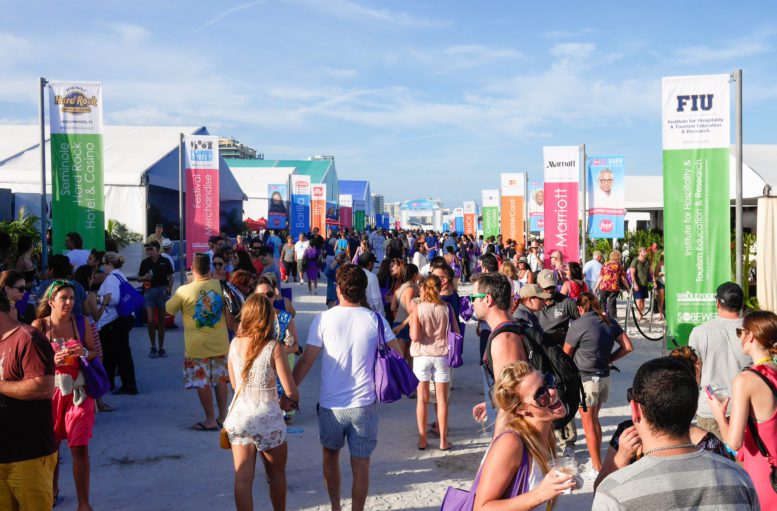

The Miami International Boat Show. Art Basel. The Olympic Games. Coachella. The sheer scale, production and, in most cases, extravagance of these mega events can create engineering and logistical nightmares.
As such, the nationally ranked Chaplin School of Hospitality & Tourism Management launched a new, fully online master’s degree in hospitality management with a specialization in mega-event planning—the first of its kind in the world.
Event sizes have grown more than 22 percent over the past 10 years and are now defined as mega events—events that attract more than 10,000 attendees. Advances in technology, the rapid pace of communication and the ability to provide a multilayered experience have fueled the increase. New technology offers audiences the wow-factor, which includes personalization and an unparalleled group experience like that at the recent Beyoncé concerts. The singer’s concerts feature an innovative app to sell merchandise, as well as perfectly timed pyrotechnics and coordinated visual displays. Mega events are evolving with many “smart” features limited only by the imagination and the digital infusion is shaping future events, start to finish.
Knowledge gap
The failures of events of this scale can be damning for investors and stakeholders. The Fyre Festival that should have been a “luxury music festival” in the Bahamian island of Great Exuma was a disaster for security, food provisions, accommodations and medical services. The 2019 Coachella Valley Music and Arts Festival was plagued with technical difficulties. And while it is near impossible to plan for the deranged intentions of a psychopath as with the 2017 Route 91 Harvest music festival in Las Vegas, the need for training in management and planning—for the foreseen as well as the unexpected—could not be clearer.
“We offer something unique,” said Dan Cormany, assistant professor of meeting, trade show and event management for the Chaplin School. “We created the degree for two reasons: it’s not offered anywhere else, and there is a great need for education.”
FIU students currently have a bit of an advantage. The Food Network & Cooking Channel South Beach Wine & Food Festival presented by FOOD & WINE gives more than a thousand students hands-on experience and invaluable networking opportunities each year. The national, star-studded, five-day destination event, with more than 60,000 guests, showcases the talents of the world’s most renowned wine and spirits producers, chefs and culinary personalities — in partnership with our Chaplin School of Hospitality & Tourism Management and Southern Glazer’s Wine & Spirits.
The master’s program
Larger events, including everything from entertainment to trade shows as well as parades and political demonstrations, are inherently more complicated, requiring additional security and facility concerns, and present greater budgetary and marketing pressures. Such considerations are not typically addressed in most event management educational programs, but are the specific focus of the fully online master’s program.
The mega-events specialization is for students who have mastered the basics of event management and are now looking to prepare themselves for the next step in their career development. Courses focus on festivals, trade shows, major conventions, sports events and concerts.
“There’s a lot that goes into mega events from coordinating personnel, volunteers and risk management to sponsorships, money and safety. Planners today also have to carefully consider the feasibility of a mega event, logistics and infrastructure capacity as well as technology,” explained Cormany.
“We’re providing students with skills and knowledge from industry professionals who will teach from experience—they’ve been doing this for 15 to 20 years—so it’s not just teaching from a textbook,” added Cormany.
The ability to gain information from those who have had firsthand experience in the mega-events industry is crucial. This could not be more evident with recent event debacles, such as the Ultra Music Festival on Virginia Key in Miami, in FIU’s backyard. This event illustrated how transportation, when not planned well, can go disastrously wrong. Stranded concert goers had to walk for miles to get back to the city while empty buses drove past.
The recent poppy bloom in Lake Elsinore, CA, a mega event fueled by social media influencers, is another example. A steady stream of 150,000 nature-destroying, selfie-taking poppy enthusiasts trekked to Walker Canyon one weekend in March. This nature mega event illustrates the need for an understanding of digital marketing, sustainability and conservation.
Hands-on opportunities
As trends feed into the mega-event guest experience, whether it be for entertainment, trade shows, art festivals, parades, demonstrations, nature or sporting events, there are growing concerns and challenges. For its online students, the Chaplin School, which has many partnerships worldwide, facilitates numerous volunteer and paid opportunities to gain hands-on experience. While not mandatory or part of the new online program, the school’s worldwide influence offers students the ability to work at events to learn about these challenges firsthand, said Cormany, who sees security as the most troubling aspect of mega events.
“After Las Vegas, everyone did a hard swallow and said, ‘We need to figure out how to do this better,’” Cormany said. “This program addresses the gap between event planning and preparations.”
-Monica Smith contributed to this report.





